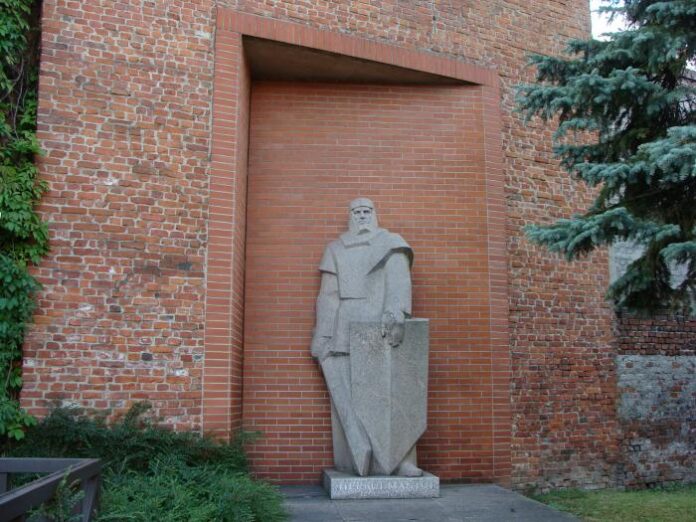

The most significant Prussian leader was the Natangian noble Herkus Monte, Herkus Mantas in Lithuanian. In his youth he had been held hostage for a long time in Germany and had a good understanding of European warfare. The Order acted with unusual brutality in suppressing the Prussian uprising, completely destroying the dwellings of the rebellious Old Prussians and eliminating their inhabitants. With the help of a regiment of the Margrave of Brandenburg and the Czech king, as well as the defection of some of the Old Prussian leaders, the Order managed to subdue all of the Old Prussian lands by 1283. There was one last uprising in 1295, but it did not result in any particular achievements.
The conquered Old Prussian lands had become part of the state of the German Order. The chronicler Simon Grunau wrote that even at the start of the 16th century, several of the districts laid waste in the 13th century remained desolate and uninhabited. After their defeat, many Old Prussians had fled the crusaders’ yoke and escaped to Lithuania. Due to the resulting lack of labour in those regions ravaged by war, the Order settled many colonists from Germany there. However, it would be untrue to say that under the Order’s rule a process of Germanization took place. In order to ensure the Prussians’ loyalty and to avert the threat of new uprisings, the knights had behaved in a tolerant way: the German colonists were allowed to settle only in the districts left barren by war, and the Order allocated the best land to the remaining Prussians. The Masters of the Order repeatedly emphasized that the Prussians must be allowed to stay Prussian, and they did not force on them the German language or way of life.
In 1525, the Catholic state of the Order became part of the secular Duchy of Prussia and Brandenburg, one of the first Lutheran countries in Europe. In the second half of the 16th century, with the support of the Duke of Prussia, three catechisms were produced in Old Prussian – significant testaments to this extinct language. Under the duchy, Poles moved into the western districts of Prussia, while Lithuanian farmers moved into the eastern areas – especially Nadrava and Skalva – and became intermixed with the Prussians. From the end of the 16th century, the parts of Prussia populated with Lithuanians started to be referred to as Lithuania Minor, which in later centuries under Czarist rule became the centre of Lithuanian national culture. It could more accurately be said that rather than being Germanized, the Prussians were Polonized and Lithuanianized.
In 1701, the Duchy of Prussia became a kingdom, and around the same time all of the rest of the German lands were united. The Old Prussian language disappeared for the most part after the Great Plague at the start of the 18th century, when almost all of the “pure” Prussians died. Their assimilated descendants instead wrote and spoke in German or Lithuanian. In 1871 a united German state was proclaimed and the Old Prussian lands remained part of the country, as the region of East Prussia, until the end of the Second World War.
At that point, the situation at the end of the crusades was repeated – the historic Prussian lands were occupied for a second time. This time this was not done by crusaders but by the Soviet army acting in accordance with the agreements made at the Yalta Conference. In 1946, the region of Kaliningrad was created, which still exists now. The German-speaking inhabitants of East Prussia were expelled to Germany, and in their place came colonists from Russia. The majority of the ancient East Prussian place names were changed to Russian names; “German” architectural monuments were destroyed.
However, the culture and language of the Old Prussians is still preserved today. The “Tolkemita” society is active in Germany; its members are former inhabitants of East Prussia and their descendants. Many of them regard themselves as Prussians. The society regularly produces collections of writing and organizes scientific conferences dedicated to the history, cultures and languages of East Prussia. In the 1980s, working with preserved examples of the Old Prussian language, the German linguist Günther Kraft Skalwynas and the Lithuanian linguist Letas Palmaitis were able to reconstruct the Old Prussian language, which they named New Prussian.
From the website Deep Baltic, by Agris Denis
Hear Prussian at YouTube:
https://www.youtube.com/watch?v=QriD_y92S4o&w=420&h=315



























